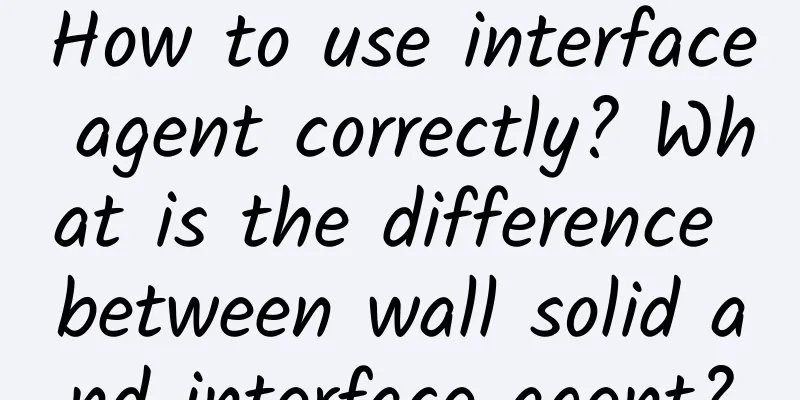How to use interface agent correctly? What is the difference between wall solid and interface agent?

|
When choosing the wall adhesion, the construction party usually uses interface agent when roughening or putting on putty. Some friends may not pay much attention to it, and have never heard of it, so they don’t know how to choose a better one. In fact, as long as it contains glue, it should be carefully selected. When choosing, we can compare the cost performance of different interface agents, and don’t choose particularly cheap ones. It is best to choose some brands. The quality of the interface agent will be more guaranteed, and the safety and environmental protection performance will be better. The following is the difference between wall solids and interface agents introduced by Encyclopedia Knowledge Network. I believe that everyone has a certain understanding of this and I hope it can help everyone. Contents of this article 1. How to use the interface agent correctly 2. What are the characteristics of the interface agent? 3. What are the main components of the interface agent? 4. What is the difference between wall solid and interface agent? 1How to use interface agent correctly1. If it is used for wall or ground coating, before construction, the wall and ground must be cleaned first, and the loose soil, dust, etc. on the surface must be removed to ensure that it is clean and not loose. 2. Next, you need to prepare the interface agent, add cement and sand, and stir in a certain proportion. You can also use electric equipment to stir evenly, and then use a brush to apply the interface agent on the base surface. Do not expose it. 3. Wait until it solidifies before you can continue to apply other wall materials. Good ventilation must be ensured after construction. 2What are the characteristics of the interface agent?1. It has very good flexibility and high viscosity. 2. It is breathable and has strong anti-freeze properties even in the cold winter. 3. A good interface agent is non-toxic, odorless, and pollution-free, so it is considered a green and environmentally friendly product. 4. Even if the air is relatively humid, construction can be carried out, and the construction is more convenient and faster. 3What are the main ingredients of the interface agent?Common interface agents are divided into two types: dry powder type and emulsion type. Dry powder interface agent is a powdery substance composed of inorganic cementitious materials such as cement, fillers, polymer powder and related additives. It has high bonding strength, excellent water resistance and aging resistance. When using, it should be mixed with water in a certain proportion and stirred. Emulsion type interface agent is made of chemical polymer materials as the main component, supplemented by other fillers. Emulsion type is divided into single component and double component according to its composition and applicable base layer. Double component products need to be mixed with cement according to the proportion when used. Interfacial agents treat the surface of objects. This treatment may be physical adsorption or coating, and is often a physical and chemical effect. The purpose is to improve or completely change the physical and technical properties and surface chemical properties of the material surface. Products that aim to change the physical and chemical properties of the interface of an object can also be called interfacial modifiers. Treating the surface of an object to improve the surface properties of the material is called surface treatment. Interfacial agents are used in different fields, and the process methods and purposes of surface treatment are different. The treatment and modification of the interface of an object by common interfacial agents can be divided into four process types: wetting and impregnation, coating treatment, coupling agent treatment, and surface modification. 4What is the difference between wall solidifier and interface agent?1. Different colors: First of all, their colors are completely different. The wall solid is yellow latex, while the interface agent is white latex. 2. Different concepts: Wall solid is a relatively new type of concrete mixture combined with a modified latex interface treatment material. Interface agent is a high-performance, relatively environmentally friendly concrete interface treatment material. 3. Different functions: The function of wall solidifier is to be used for base treatment and cement roughening treatment, while the function of interface agent is for base treatment of wall-floor interface. |
<<: What is an interface agent? What is the role of an interface agent?
>>: Why do we need to paint the wall? What are the hazards of wall paint to the human body?
Recommend
What are seasonal skin allergies? What should I pay attention to?
The change of seasons is supposed to be a happy t...
The benefits of eating Panax notoginseng powder for women
As a common product for promoting blood circulati...
Left breast pain
The health of the breast area has been receiving ...
Methods of care for maternal episiotomy wound
Many women who give birth naturally need to have ...
How to keep fresh abalone overnight? How to store abalone if you don't eat it for the time being
Abalone is a precious marine edible shellfish, kn...
Is it normal to have brown discharge two days before your period?
Some girls will have secretions before their peri...
After giving birth, I feel like urinating but can't urinate
Compared with caesarean section, natural birth is...
Signs of recurrence after cervical cancer surgery
Women will encounter many types of gynecological ...
Does menstruation mean ovulation?
As long as you are healthy and your menstrual cyc...
If you don't take a bath correctly in winter, be careful not to take a "fatal bath"
Cold winter Take a comfortable hot bath It's ...
Is urine pregnancy test accurate?
Many people will choose to buy pregnancy test sti...
Painful lumps in the chest
In our lives, many women have some breast disease...
China Health and Nutrition Survey: U-shaped association between dietary vitamin B1 intake and risk of new-onset hypertension
Vitamin B1 (thiamine) is a water-soluble vitamin ...
What should I do if I don’t get paid because of the epidemic? What side jobs can I use to make money during the epidemic?
Recently, due to the epidemic, many people are tr...
How do women react after ejaculation?
How do women feel when a man ejaculates during se...









